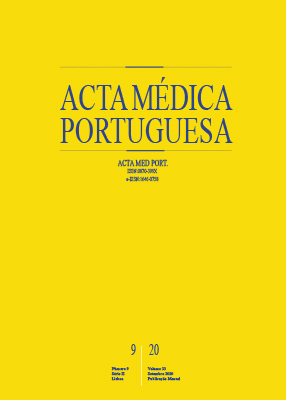ERAS® Program in a Portuguese Hospital: Results from Elective Colorectal Surgery after One Year of Implementation
DOI:
https://doi.org/10.20344/amp.11158Keywords:
Colon/surgery, Digestive System Surgical Procedures, Elective Surgical Procedures, Perioperative Care, Portugal, Rectum/surgeryAbstract
Introduction: The Enhanced Recovery After Surgery® program comprises the implementation of various perioperative measures that reduce surgical stress and ultimately improve patient recovery and outcome. The purpose of this study is to evaluate the first-year compliance and clinical outcomes after implementation of the Enhanced Recovery After Surgery® program in elective colorectal surgery in our hospital.
Material and Methods: An analysis was performed on the 210 patients who underwent elective colorectal surgery from May 2016 to December 2017. The group of patients that underwent surgery after the protocol implementation (Enhanced Recovery After Surgery® group) was compared to a conventional care control group (pre- Enhanced Recovery After Surgery® group). Differences between the two groups were adjusted using Propensity Score matching. The main outcomes were length of stay, return of bowel function, complications and mortality. The evolution of compliance with Enhanced Recovery After Surgery® principles was also analyzed.
Results: After propensity score matching, 112 patients were included in the present study: 56 patients formed the pre-Enhanced Recovery After Surgery® group and 56 the Enhanced Recovery After Surgery® group. The overall adherence to the protocol increased from 35.7% to 80.8%. There was a decrease in length of stay, time to return of bowel function and medical complications.
Discussion: The Enhanced Recovery After Surgery® program is safe and seems to shorten length of stay and improve patient recovery and clinical outcome.
Conclusion: This study showed that the implementation of the Enhanced Recovery After Surgery® program was possible in Hospital Beatriz Ângelo, with a positive impact in the immediate postoperative recovery of colorectal patients.
Downloads
Downloads
Published
How to Cite
Issue
Section
License
All the articles published in the AMP are open access and comply with the requirements of funding agencies or academic institutions. The AMP is governed by the terms of the Creative Commons ‘Attribution – Non-Commercial Use - (CC-BY-NC)’ license, regarding the use by third parties.
It is the author’s responsibility to obtain approval for the reproduction of figures, tables, etc. from other publications.
Upon acceptance of an article for publication, the authors will be asked to complete the ICMJE “Copyright Liability and Copyright Sharing Statement “(http://www.actamedicaportuguesa.com/info/AMP-NormasPublicacao.pdf) and the “Declaration of Potential Conflicts of Interest” (http:// www.icmje.org/conflicts-of-interest). An e-mail will be sent to the corresponding author to acknowledge receipt of the manuscript.
After publication, the authors are authorised to make their articles available in repositories of their institutions of origin, as long as they always mention where they were published and according to the Creative Commons license.









